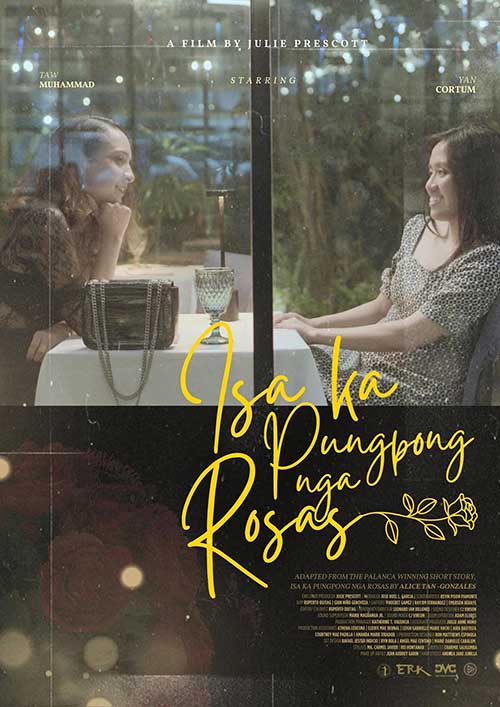
By Mariela Angella Oladive
University of the Philippines Visayas (UPV) Assistant Professor Julie Prescott’s directorial debut, “Isa ka Pungpong nga Rosas,” premiered at the UPV Cinematheque in Iloilo City on June 15.
Adapted from retired UPV professor Alice Tan-Gonzales’ Palanca Award-winning short story, the film navigates complex themes of love, trauma, and queer relationships.
Prescott, a self-described “literature person,” felt a deep connection to the story. “Tan-Gonzales’ Isa Ka Pungpong nga Rosas deeply resonates with me, making it an ideal choice for my directorial debut. It was the first short story by Tan-Gonzales that I read,” she said.
Starring Yan Cortum and Taw Muhammad, the film centers around Gemma, played by Cortum, a woman grappling with a troubled past and a complicated romantic entanglement. The narrative unfolds during Gemma’s birthday celebration with Clare (Muhammad), a queer woman she meets at a bar. Through their interaction, the film reveals layers of Gemma’s life, exposing her struggles and deep-seated childhood trauma.
Prescott shared her experience making her first film. “It was scary. I’m scared about the reception. I’m scared about not being able to give justice to the original story. I want to give it justice but at the same time put my own adaptation. There were difficulties, but it was very much a learning experience,” she said.
The screenplay, penned by Prof. Kevin Piamonte, and the cinematography by Ruperto Quitag and Gian Niño Genoveza, work in tandem to bring Tan-Gonzales’ story to life. The visuals enhance the storytelling, with each frame thoughtfully composed to reflect the characters’ internal states. The decision to spotlight the minutiae of everyday moments adds a layer of authenticity and intimacy, making the audience feel like silent observers of Gemma and Clare’s unfolding bond.
Prescott highlighted the collaborative effort involved, consulting with various experts to ensure an inclusive interpretation. “I worked with Director Piamonte on the script. I consulted with a lot of people because I don’t want my interpretation to be one-dimensional. I checked it with someone who is a psychologist and also part of the LGBTQ community to ensure inclusive interpretation,” Prescott expressed. “I want the film to speak for itself. As a director, I have something I want to say, and I tried to say that in the film. At the same time, the film takes on a life of its own. The message will depend on the audience’s interpretation,” she added.
Prescott’s adaptation intentionally centers on women, almost never showing the faces of men, to highlight the women’s experiences and relationships. The film’s frequent close-ups capture subtle emotional cues, creating a strong sense of connection between the characters without resorting to explicit scenes.
Using a mix of Hiligaynon and English adds to the film’s relatability and impact. This bilingual approach lends authenticity to the film, grounding it in its local setting and making the characters’ interactions feel genuine and lived-in.
The film also addresses the harrowing theme of childhood trauma, revealing Gemma’s past as a victim of sexual abuse. Her silence on the matter and the subsequent internalization of this trauma reflect the pervasive patriarchal values surrounding virginity and purity in Filipino society. These values hinder Gemma from pursuing healthy relationships. This context is essential in understanding her deep connection with Clare.
Seeking solace from the constraints of heteronormative expectations, Gemma finds comfort and understanding in Clare, who offers her the acceptance and support she desperately needs.
In exploring these themes, the film critically engages with the patriarchal notion of virginity, which perpetuates a form of sexual control over women, where their worth is often measured by their sexual purity.
Premiering during Pride Month, the film celebrates queer identities and relationships. Initially scheduled for a single public screening, the overwhelming response led to two additional showings.
In the Philippines, queer women often remain less visible compared to their gay counterparts. This disparity in visibility reflects broader societal attitudes where gay men are more prominently represented in media and public discourse, while queer women’s stories are frequently sidelined.
“Isa ka Pungpong nga Rosas” challenges this narrative by placing queer women at the forefront, exploring their lives and relationships with the same depth and respect traditionally afforded to other stories.
The film was funded by ACCL Productions and supported by the UPV Division of Humanities. It was co-presented by ERK Film Production, DMC, and Prime Media Hub. Prescott expressed hope for future screenings of the film.




















